Welcome to another edition of Willoughby Hills!
This newsletter explores topics like history, culture, work, urbanism, transportation, travel, agriculture, self-sufficiency, and more.
I recently met a friend for coffee. He suggested we try a new coffee shop near his house in Amherst, MA that had just opened and I agreed.
Amherst is an active small town, with a pretty bustling “Main Street” district. The proximity of both the public University of Massachusetts Amherst and the private Amherst College keep the downtown busy year round with festivals, farmers markets, and the like. The center of Amherst features a few name brand places, but is mostly made up of local coffeehouses, restaurants, bars, and stores selling books, records, toys, and various antiques.
Amherst Center is thriving. But we weren’t meeting in Amherst Center.
The coffee shop my friend recommended sits on a traffic circle about 2 miles south of the center of town. There’s a small hub of activity around that rotary: a small gas station, a takeout pizza place, a local bar, and a couple of other businesses. But walk 2 minutes in any direction, and the street quickly changes. There are a handful of residential streets, but also a lot of agricultural and conservation land. This may not be the middle of nowhere, but it’s certainly at the edges of nowhere. A far cry from the downtown area just up the road.
West Street Coffee and Tea is a relatively new addition to the neighborhood, opening late last year in a building that was built as a bank branch but has been repurposed a number of times.
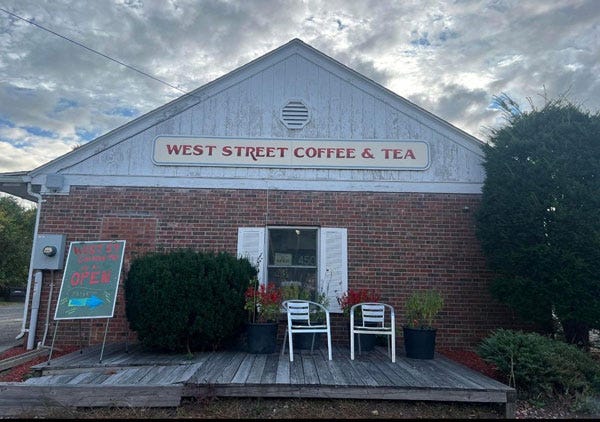
It’s a basic coffee shop meant to serve the community. The beans aren’t roasted on site, nor are they unique to this locatio, but they are high quality. They’re purchased from Fogbuster Coffee Works in Greenfield, a few miles away (and it’s organic coffee, which is important to me for a variety of reasons).
The baked goods come from the bakery next door. There’s a basic menu of small food items that can be cooked in the simple kitchen (grilled cheese, egg sandwiches, etc). It’s not exactly the kind of place you’d go of more than a cup of coffee, a clean bathroom, and free WiFi, which is exactly what we did.
When my friend and I met for coffee, we each had a small drip coffee. It was premade, in a self-serve insulated container that we poured ourselves. The shop had paper to-go cups, but for those staying in the restaurant, there was an assortment of ceramic mugs available, most of them completely random. I used one featuring the lighthouses of Prince Edward Island. It was more like drinking coffee at a friend’s house than going to a cafe, at least in the era of everything being simplified, standardized, and “aesthetic.”

Our two cups of coffee, including tax and a decent tip, came out to about $8.00. We sat on the patio for the next hour or so, chatting and slowly sipping our coffees.
While we were there, the dining rooms were also completely occupied, but there weren’t exactly “full.” There was one group of two quietly chatting at one table, but the other eight or so tables each featured one person, either quietly reading or typing away on laptops. There were two small dining rooms- one more open adjacent to the kitchen/counter, and a smaller “library” room that seemed to encourage quiet study/reading.
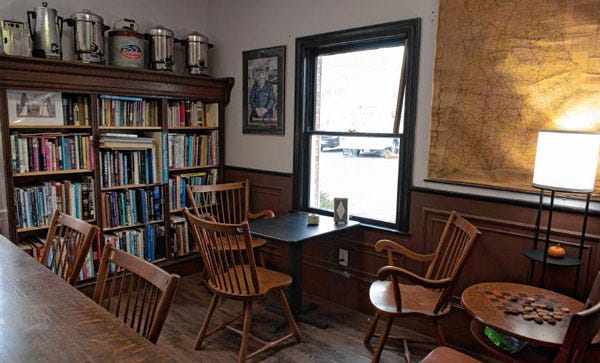
There was a part of me that marveled at the simplicity of this operation: a community gathering place that was basically repackaging the goods of others (coffee, baked items, etc) and making them accessible in a place that’s welcoming. It’s exactly the kind of business that should be in every community, along with other small services and gathering places (think independent book stores, small grocers, and small restaurants).
But most communities don’t have a small coffee shop like this.
And thinking about the logistics of trying to profitably run a small coffee shop, I can understand why.
My friend and I spent less than $10, including gratuity at West Street. I don’t know how that begins to cover any of the overhead of running a coffee shop, from wages to utilities to insurance, and the place wasn’t especially busy while we were there, so they weren’t making it up in volume.
Perhaps that’s why in most parts of the country, a local gathering place like this has become the domain of the large corporations, like Starbucks or Panera.
Although, as Austin Frerick and I discussed on the podcast, even if we may have three or four chain coffee shops in town, they are often only meant to give an illusion of choice, with many coffee shops falling under a single, consolidated owner.
For example, the German conglomerate JAB Holdings owns Peet’s Coffee, Caribou Coffee, Einstein Bros Bagels, Bruegger’s Bagels, Manhattan Bagel, Krispy Kreme, Pret A Manger, Panera Bread, Stumptown, Intelligentsia, Green Mountain Coffee, and Keurig Dr. Pepper, to name a few. Whether you’re brewing a pod coffee at home, going to a bagel shop, a donut shop, or a fancy place like Intelligentsia, you’re benefitting the same parent company. Sobering.
These corporate coffee shops are meant to emphasize convenience over community, with drive thrus replacing dining rooms. They are also meant to maximize revenue, pushing crazy add-ons and special flavors that bring a $2.00 cup of coffee to $6.00 or $8.00.
Starbucks’s website is currently advertising a Salted Caramel Cream Cold Brew, an Iced Horchata Oatmilk Shaken Espresso, and summer berry drinks with coconut milk and raspberry flavored pearls. Those don’t come cheap! (Starbucks is also on the boycott list as a company that supports Israel, has a horrible track record with recognizing unions, and has a reputation for using lower quality beans and over-roasting them to maximize yield, if you needed more reasons to avoid the corporate chains.)

It’s worth noting too that while West Street benefits from being in a somewhat multimodal community, accessing it by car is still easiest. There is a sidewalk that runs north from the coffee shop all the way to Amherst Center and south to the more rural campus of Hampshire College, although the sidewalk switches sides of the street frequently. Sidewalks barely extend east to west, abruptly ending where many of the residential areas are. (If you’re new here, I talk about sidewalks a fair amount…)
The coffee shop also sits on a bus line and is near a rental bike station, but there aren’t any dedicated bike lanes near it, nor is it right on a bike path.
So despite being “accessible” by many modes, most will probably still opt to drive here, which begs the question: is supporting a local business “worth it” to local residents if getting a cup of coffee involves stopping, parking, and getting out of the car? After all, the nearest Starbucks has a drive thru, and if you’re already in the car, why not stay in the car?
It was a place we visited for a special occasion, but it’s hardly a daily routine (at least for me, because it’s not in my neighborhood). It’s not even on a major highway or even a feeder road that serves commuters. It’s literally just a neighborhood coffee spot that appeals to a very specific person.
From my perspective though, there’s something vital and necessary in these local gathering places that is hard to quantify or define in solely economic terms. They give an area character. They build community. They foster conversations. In other words, they’re about more than just the bottom line.
A few years ago, I wrote about the evolution of the local tavern in the U.S. and I can’t help but see West Street Coffee and Tea as an extension of that general idea. The Revolutionary War was discussed, plotted, and planned in the dark taverns of Lexington and Concord, where the community gathered. What does the corporatization of our shared spaces portend for our democracy, our future?
Unfortunately, in our time though, the bottom line does matter. Businesses need to be able to pay their bills, their rent, their wages. If they can’t, they close. And suddenly, we’re left with the illusion of choice of 12 different coffee shops that are all basically benefitting one company.
At a minimum, when our neighborhoods are lucky enough to have an independent coffee shop, book store, grocer, or bar, we should try to support them with our business.
But I also wonder if some of these independent places might benefit from some other intervention as well? We offer tax breaks to agricultural companies, film producers, and other businesses that bring jobs or economic benefits to our cities. Perhaps we should also consider subsidizing those small businesses that bring us together, that define our communities, and that stand against the corporate takeover of nearly everything.
I don’t see that happening anytime soon, but my recent coffee meeting has me thinking more deeply about the role small businesses play in our communities.
Do you have a cool local coffee shop near you or another unique community gathering place? What does it take to keep a local business viable? Should we all support these local spots through some kind of subsidy, or should small businesses be forced to compete with corporate giants? I’d love to hear your thoughts in the comments.
Thanks for reading Willoughby Hills! Subscribe for free to receive new posts and support my work.
Related Reading
Pay What You Call For and Drink What You Please
If you’ve missed past issues of this newsletter, they are available to read here.


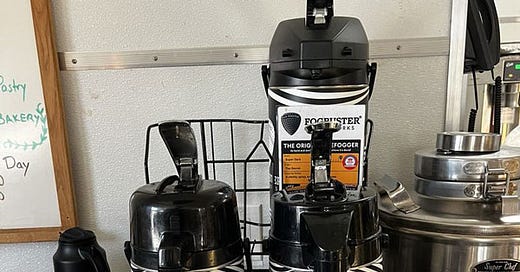


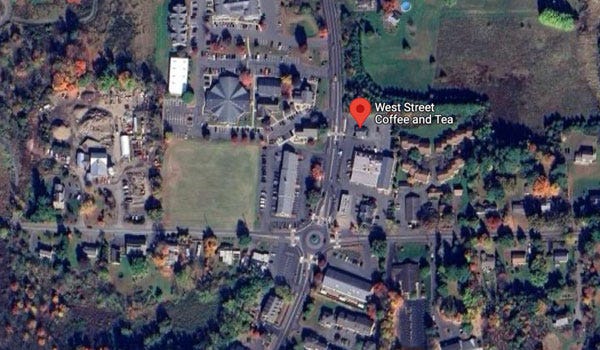
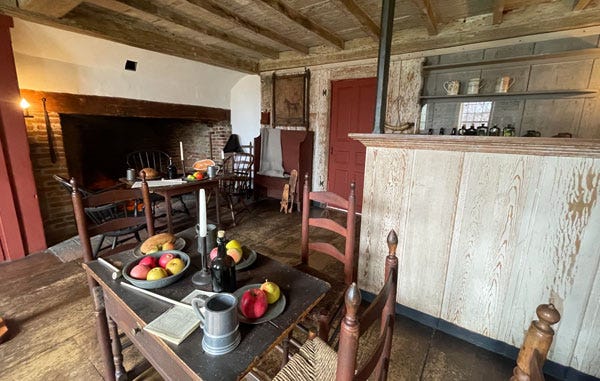
And Peet's was started as a local coffee shop on Vine St. in Berkeley in 1966 with the express purpose of the founder, a Dutchman Alfred Peet, to bring rich, strong Arabica coffee to his new home. By the time I moved to the Bay area in 1970, the cafe was well-established and often had a line out the door. Peet opened a 2nd location in Menlo Park in 1971. That was the same year that he mentored 3 guys, loaned them his roasted beans which they took to Seattle and started Starbucks. It's been sort of shocking to watch Peet's grow and be bought up. But Bill still likes Peet's Major Dickason blend which we now get at Costco.
Great essay, Heath. I have been getting my beans at a small independent shop/roaster here in NoVA, ever since I learned the Peets I had been drinking for a few years is connected to Israel's genocide in Gaza. We're also fortunate we have a lot of independent, family-run Vietnamese coffee shops.